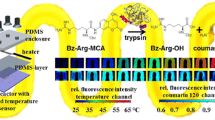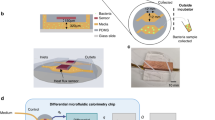Abstract
A hybrid microsystem with separately functioned temperature controlling substrate and sample operating fluidic microchannel was developed to demonstrate a reconfigurable microfluidics scheme. The temperature controlling substrate integrated a micro heater and a temperature sensor by using traditional silicon-based micromechanical system (MEMS) technique, which guaranteed high performance and robust reliability for repeatable usage. The sample operating fluidic microchannel was prepared by poly-(dimethylsiloxane) (PDMS) based soft lithography technique, which made it cheap enough for disposable applications. The PDMS microchannel chip was attached to the temperature controlling substrate for reconfigurable thermal applications. A thin PDMS film was used to seal the microchannel and bridge the functionalized substrate and the sample inside the channel, which facilitated heat transferring and prevented sample contaminating the temperature controlling substrate. Demonstrated by a one dimensional thermal resistance model, the thin PDMS film was important for the present reconfiguration applications. Thermal performance of this hybrid microsystem was examined, and the experimental results demonstrated that the chip system could work stably over hours with temperature variation less than 0.1°C. Multiple PDMS microchannel chips were tested on one heating substrate sequentially with a maximum intra-chip temperature difference of 1.0°C. DNA extracted from serum of a chronic hepatitis B virus (HBV) patient was amplified by this hybrid microsystem and the gel electrophoresis result indicated that the present reconfigurable microfluidic scheme worked successfully.
Similar content being viewed by others
References
George M W. The origins and the future of microfluidics. Nature, 2006, 27: 368–373
Nathaniel C C, Scott S, Carl A B. Nucleic acid purification using microfabricated silicon structures. Biosens Bioelectro, 2003, 19: 59–66
Cameron D S. A PDMS sheath flow cuvette for high-sensitivity LIF measurements in CE. Electrophoresis, 2009, 30: 372–378
Yu L F, Huang H Q, Dong X L, et al. Simple, fast and high-throughput single-cell analysis on PDMS microfluidic chips. Electrophoresis, 208, 29: 5055–5060
Chen Y, Duan H T, Zhang L Y, et al. Fabrication of PMMA CE microchips by infrad-assisted polymerization. Electrophoresis, 2008, 29: 4922–4927
Osiri J K, Shadpour H, Park S J, et al. Generating high peak capacity 2-D maps of complex proteomes using PMMA microchip. Electrophoresis, 2008, 29: 4984–4992
Niu X Z, Peng S L, Liu L Y, et al. Characterizing and patterning of PDMS-based conducting composites. Adv Mater, 2007, 19: 2682–2686
Colin D, Karan V I S K. A cost effective, re-configurable electrokinetic microfluidic chip platform. Sen Actuators B, 2006, 123: 628–635
Yu C Y, Liang W S, Kuan I, et al. Fabrication and characterization of a flow-through PCR device with integrated chromium resistive heaters. J Chin Inst Chem Eng, 2007, 38: 333–339
Ha S M, Ju J K, Ahn Y, et al. Separation type multiplex PCR chip for detecting male infertility. Jap J Appl Phys, 2008, 47: 5231–5235
Yamamoto T, Nojima T, Fujii T. PDMS glass hybrid microreactor array with embedded temperature control device. Application to cell-free protein synthesis, Lab Chip, 2002, 2: 197–202
Joung S R, Kim J, Choi Y J, et al. Proceedings of the 2nd IEEE International Conference on Nano/Micro Engineered and Molecular Systems, Thailand, 2007. 691–694
Northrup M A, Ching M T, White R M, et al. DNA amplification in a microfabricated reaction chamber. Transducers’93, Japan, 1993. 924–926
Daniel J H, Iqbal S, Millington R B, et al. Silicon microchambers for DNA amplification. Sen Actuators A, 1998, 71: 81–88
Wang W, Li Z X, Luo R, et al. Droplet-based microoscillating-flow PCR chip. J Micromech Microeng, 2005, 15: 1369–1377
Kopp M U, Mello A J, Manz A. Chemical amplification continuous-flow PCR on a chip. Science, 1998, 280: 1046–1048
Hashinoto M, Chen P C, Mitchell M W, et al. Rapid PCR in a continuous flow device. Lab Chip, 2004, 4: 638–645
Cao B Y, Sun J, Chen M, et al. Molecular momentum transport at fluid-solid interfaces in MEMS/NEMS: A review. Int J Mol Sci, 2009, 10: 4638–4706
Guo Z Y, Li Z X. Size effect on microscale single-phase flow and heat transfer. Int J Heat Mass Transfer, 2003, 46: 149–159
Wang P X. Heat and Mass Transfer Engineering (in Chinese). Beijing: Science Press, 1998
Wang W, Li Z X, Guo Z Y. Numerical simulation of micro flow-through PCR chip. Microscale Thermophys Eng, 2005, 9: 281–293
Author information
Authors and Affiliations
Corresponding author
Rights and permissions
About this article
Cite this article
Lei, Y., Xie, F., Wang, W. et al. Hybrid microsystem with functionalized silicon substrate and PDMS sample operating microchannel: A reconfigurable microfluidics scheme. Sci. China Technol. Sci. 53, 2272–2277 (2010). https://doi.org/10.1007/s11431-010-3175-5
Received:
Accepted:
Published:
Issue Date:
DOI: https://doi.org/10.1007/s11431-010-3175-5




